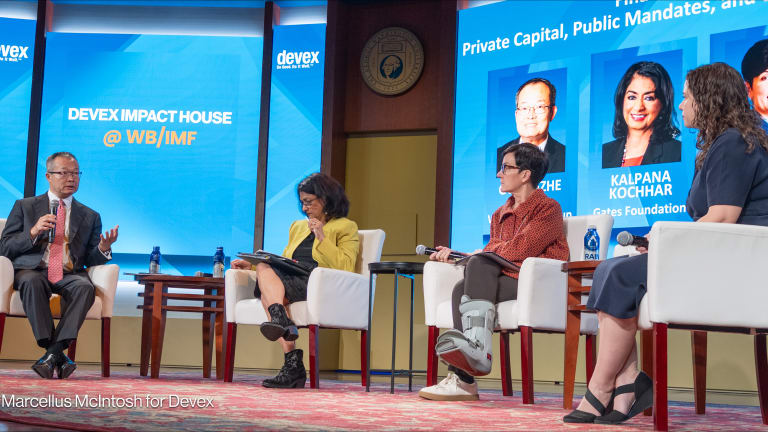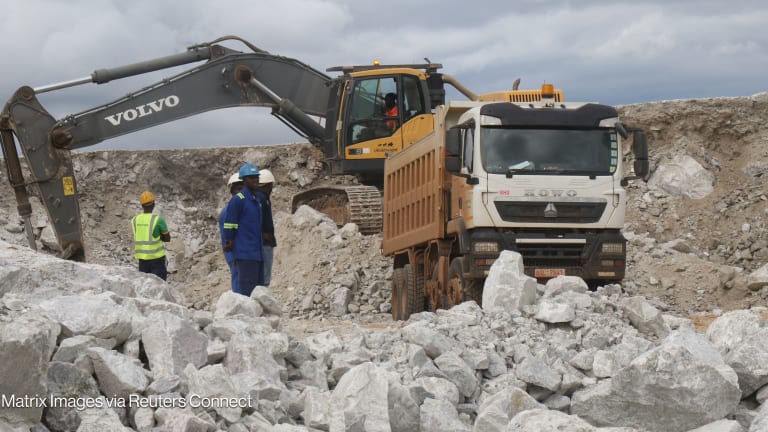
Scaling up private sector investments in lower- and middle-income countries is crucial to ensure the world’s poorest regions will have access to clean energy by the end of this decade. That was the message Friday from high-level financial experts during the final day of United Nations-hosted ministerial forums on energy.
At stake is whether the world will meet Sustainable Development Goal 7, which aims to ensure access to affordable and clean energy for all by 2030.
There are over 800 million people in Africa who don’t have access to clean energy, and “if you look at the limited fiscal space in our countries of operations today, we won’t get there without a substantive increase from the private sector,” said Stephanie von Friedeburg, senior vice president for operations at the International Finance Corp., the private sector-focused member of the World Bank Group.
Nigerian minister decries defunding of gas projects as inequitable
An environment official from Nigeria — which has Africa's largest natural gas reserves — says lower-income nations are held to a different standard for decarbonizing.
It’s not easy to attract private financing in the energy sectors of the developing world because such investments are often seen as risky. Poorly designed energy policies, unstable market frameworks, unclear infrastructure planning, a lack of fiscal incentives, and rule-of-law issues are some of the key barriers, according to a report released on the sidelines of an event focused on finance and investments.
“In the face of constrained public finance, it will be essential to increase private-sector investment in the electricity market to close the access gap,” it reads.
Africa’s current installed energy capacity of 250 gigawatts needs to double by 2030 and increase fivefold by 2050 to meet the continent’s rising energy demand, said Vera Songwe, executive secretary of the U.N. Economic Commission for Africa. Meeting this decade’s goal requires investments of over $500 billion, she said, adding that the private sector is “expected to play an important role.”
Achieving the SDG 7 targets on energy access will require annual investments of around $35 billion for electricity access and $6 billion for clean cooking between now and 2030, according to the report.
The world needs to step up the delivery of public financing to achieve SDG 7 and make sure it’s used effectively “to bring in additional private capital,” said Mary Warlick, deputy executive director at the International Energy Agency.
The report recommends a few ways of scaling up private investments.
Lower-income country governments need to put in place stable and reliable policies that make their markets more open and attractive, which “in turn, boosts investor confidence and influences the cost and availability of finance for new clean-energy projects,” according to the report.
To mobilize a much larger amount of private capital, these governments also need to ramp up the proportion of green spending in their economic plans.
“In the face of constrained public finance, it will be essential to increase private-sector investment in the electricity market to close the access gap.”
— “Theme Report on Finance and Investment: Towards the Achievement of SDG 7 and Net-Zero Emissions”Internationally, public banks and financiers such as multilateral development banks “need to step up their role as catalysts” for private investments in clean energy, the report says. One option is blended finance, which mixes commercial lending with grants, concessional loans, or technical assistance as a way of supporting projects in riskier markets. Offering guarantees for political, credit, and liquidity risks is also a good option, according to the report.
IFC’s von Friedeburg said the organization will significantly increase its investments in renewables such as solar, wind, and mini grids. “Once we’ve created a series of bankable projects through this process, we will need to crowd in the private sector” through the blended finance option, she said.
The U.N. held multiple ministerial forums this week, bringing together ministers and experts from around the world to discuss various challenges in the energy transition. The events precede the High-Level Dialogue on Energy scheduled for September, when countries are expected to step up their climate and decarbonization commitments ahead of the 2021 United Nations Climate Change Conference in November.
This coverage exploring innovative finance solutions and how they enable a more sustainable future, is presented by the European Investment Bank.









